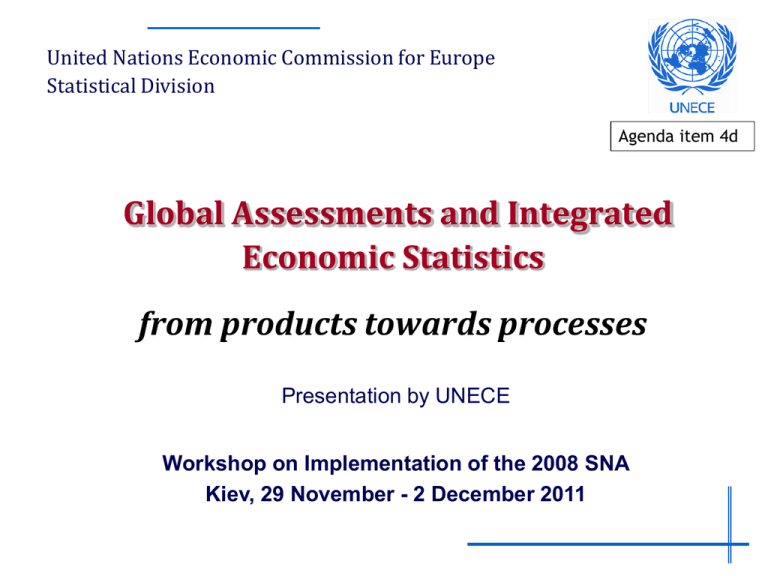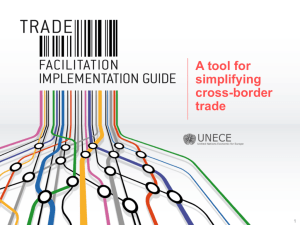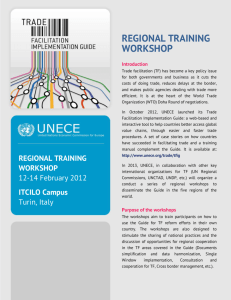Global Assessments and Integrated Economic Statistics from products towards processes
advertisement

United Nations Economic Commission for Europe Statistical Division Agenda item 4d Global Assessments and Integrated Economic Statistics from products towards processes Presentation by UNECE Workshop on Implementation of the 2008 SNA Kiev, 29 November - 2 December 2011 Aim of Global Assessments The aim of a global assessment of the national statistical system is to provide a clear picture of the state of development of official statistics in the country. The NSO to plan long-term development of statistics National authorities to better understand the role and the mission of official statistics and ultimately to allocate additional financial and human resources International partners to have a better knowledge of the state of development of the statistical system in the country for planning capacity building programmes UNECE Statistical Division Slide 2 2 2009 EECCA Seminar in Yalta /1 Management Seminar on Global Assessments for EECCA countries organized by EFTA-Eurostat-UNECE in September 2009 in Yalta Heads and deputy heads of 11 national statistical institutes participated: Armenia, Azerbaijan, Belarus, Georgia, Kazakhstan, Kyrgyzstan, Moldova, Mongolia, Russia, Tajikistan, Ukraine Experts from international organizations and from Iceland, the former Yugoslav Republic of Macedonia and Norway UNECE Statistical Division Slide 3 3 2009 EECCA Seminar in Yalta /2 UNECE Statistical Division Slide 4 4 2009 EECCA Seminar in Yalta /3 Participants and organizers agreed on the following: The National Statistical Systems of the EECCA countries could largely benefit from Global Assessments EFTA-Eurostat-UNECE offer to conduct global assessments in the region in a coordinated way Global assessments would be conducted under the strict condition that the country request it (demand-driven) Eurostat shall be the leading organization for the ENP-East countries (EEC) and UNECE for Central Asia countries (CA) EEC countries send their requests to Eurostat and CA countries to UNECE UNECE Statistical Division Slide 5 5 The 5 Stages of a Global Assessment /1 Stage 1 – Preparatory work Available reference and information materials about the NSS are collected through an assessment guidance questionnaire Stage 2 – First Assessment mission 5-day global assessment mission from EFTA – Eurostat – UNECE experts to collect in-depth information from producers and users of statistical information about the NSS Stage 3 – Interim consultations – Draft report Production of a draft report submitted to the National Statistical Institute for consultation and, if necessary, ongoing ad-hoc consultation with producers and users in the country UNECE Statistical Division Slide 6 6 The 5 Stages of a Global Assessment /2 Stage 4 – Second Assessment mission Discuss the draft report with the National Statistical Institutes and other stakeholders and propose recommendations Stage 5 – Final reporting The final global assessment report including recommendations to be approved by the assessors and the National statistical Institutes UNECE Statistical Division Slide 7 7 Next Challenges for National Statistical Systems + Increasing demand for relevant, quality and timely statistics to monitor economic, monetary, social and environmental policies - Economic and financial crises with additional budget constraints for national administrations - Budget cuts for technical cooperation at international level - Pressure to further reduce response burden ___________________________________________________________________________ = Streamlining statistical production processes from the data collection to the dissemination UNECE Statistical Division Slide 8 8 What Does Streamlining Mean? Streamlining can be defined as adapting the business and technology infrastructure in order to deliver statistical information that meets user’s requirements in a more effective and efficient way. Effective: Adequate to accomplish a purpose; producing the intended or expected result: an effective decision Efficient: Performing or functioning in the best possible manner with the least waste of time and resources (human and financial) UNECE Statistical Division Slide 9 9 Integrated Economic Statistics: from Products towards Processes Integrated economic statistics approach does not focus only on products or services but also on the means to achieve them Effective design and improvement of processes that ensure that products and services are fit for their purpose and meet their specification (Quality management) Quality management is also referred to as business management or integrated management More ex-ante quality assurance built into the production process rather than a ex-post quality control on products UNECE Statistical Division Slide 10 10 From the Stovepipe Model … The stovepipe model is an organisation of the production where each substantive department has exclusive ownership over the production process of one or more specific statistical product Excessive burden on respondent: each statistical product relies on its own data sources Inefficient: this model does not allow to standardize statistical production and to deploy common IT platform and tools Inconsistent: the same statistical information from different sources are not systematically reconciled and might diverge; One-dimensional: the model is not well adapted to the primary data collection on statistical domains that cover multiple dimensions, such as national accounts, globalization or environment. UNECE Statistical Division Slide 11 11 … to the Integrated Model The integrated model is based on common and standardised processes, transforming a combination of primary data into statistical products Vertical integration (simplification of the production chain): Reducing the unnecessary layers and tasks between the data collection and the dissemination Horizontal integration (economy of scale): Increasing the operational coordination of the National Statistical System by organizing jointly the collection of primary statistical data and avoiding duplication of tasks UNECE Statistical Division Slide 12 12 Coverage of Global Assessments The legal and institutional aspects of the national statistical system Fundamental principles of Official Statistics and the European Statistics Code of Practice The technical and organizational capacity to produce and disseminate official statistics in all relevant areas: Data collection mechanisms, data processing and editing, quality monitoring, registers and dissemination The compliance of statistical output with international standards, norms and recommendations UNECE Statistical Division Slide 13 13 International standards / nomenclatures / guidelines Coherent Business processes SNA BoP Sectoral statistics STS – SBS – CPI – ETS – GFS … Statistical registers Data warehouse Editing and processing (quality control) Data collection Integrated Administrative data – Surveys – Censuses Effective Legal / institutional / organizational framework UNECE Statistical Division Slide 14 Conclusions Global assessments address all elements of quality, coherence and efficiency of statistical systems and contribute to an integrated approach of the statistical production The consistency and exhaustiveness of national accounts data can substantially benefit from a more integrated production of economic statistics In return, the national accounts, as the overarching framework for economic statistics, is an essential tool for improving the coherence of major sectoral statistics Streamlining statistical production is an ongoing task since economic statistics must constantly adapt to the evolving environment (e.g.: globalization) UNECE Statistical Division Slide 15 15 Processes are embedded in products UNECE Statistical Division Slide 16 Thank you for your attention. UNECE Statistical Division Slide 17




